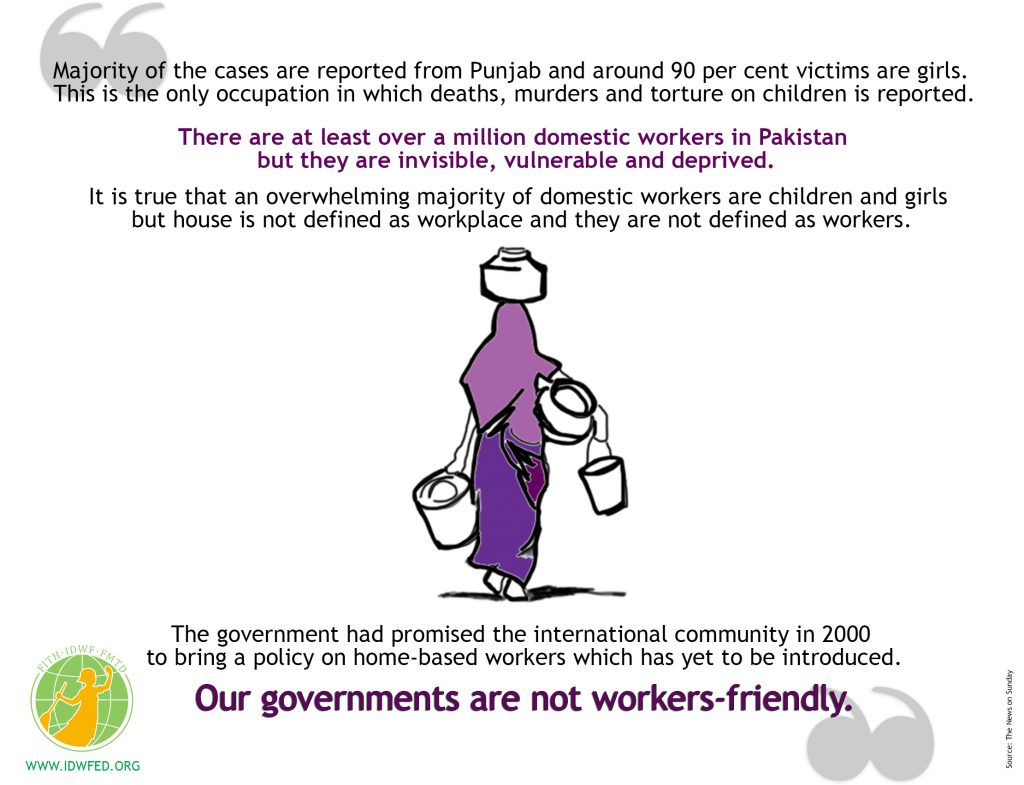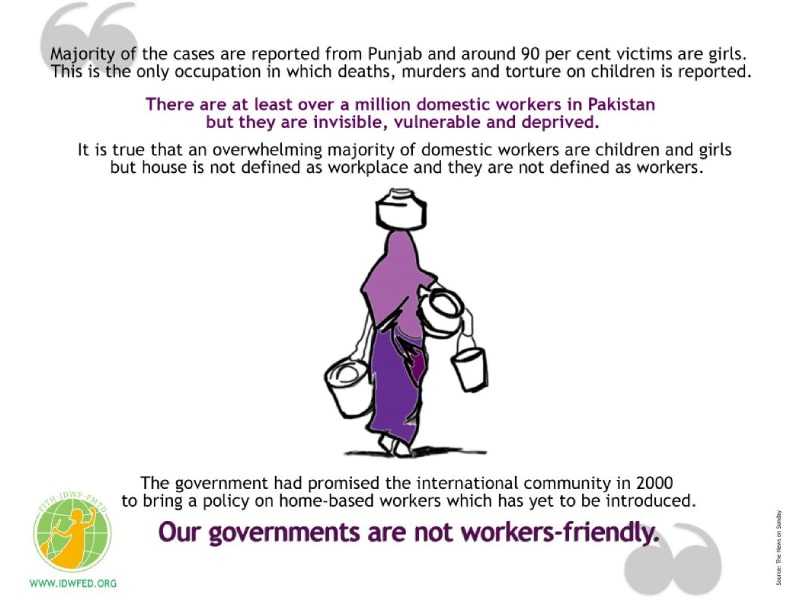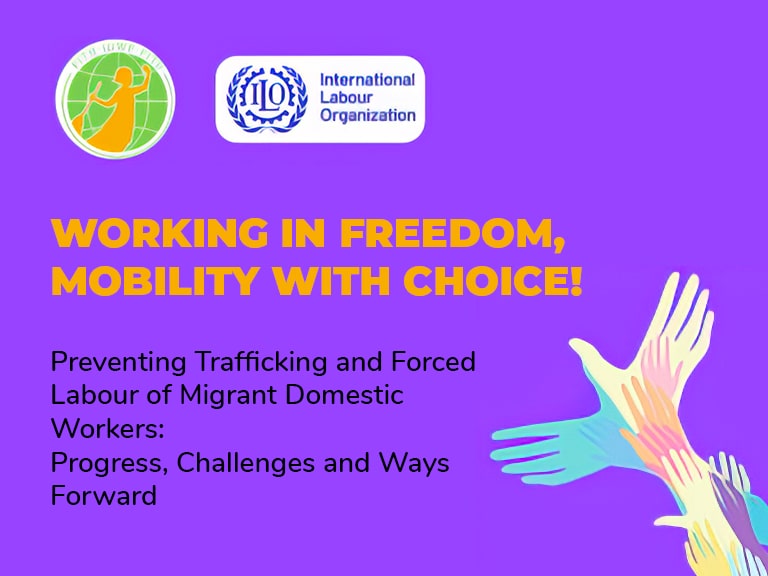- This event has passed.
In Pakistan, domestic workers are still struggling hard to get their basic rights to work and live
In August 2010, Tehmina, a twelve-year-old girl from Multan district who worked as a domestic help in a house situated in a posh neighourhood in Islamabad, was pushed off a balcony by her employer for demanding salary. She suffered spinal-cord injuries and was paralysed. Though her poor father managed to get a case registered against her employers with the help of civil society and media, he reached an out-of-court settlement with Tehmina’s employers after two months.
Details

The story of Tehmina
In August 2010, Tehmina, a twelve-year-old girl from Multan district who worked as a domestic help in a house situated in a posh neighourhood in Islamabad, was pushed off a balcony by her employer for demanding salary. She suffered spinal-cord injuries and was paralysed. Though her poor father managed to get a case registered against her employers with the help of civil society and media, he reached an out-of-court settlement with Tehmina’s employers after two months.
He took crippled Tehmina with her after her employers reportedly paid him Rs350,000. After three months, Abdullah Khoso, an Islamabad-based activist affiliated with Institute for Social Justice (ISJ) which works for labour rights advocacy and research and supported Tehmina’s father to fight the case against her employer, visited the family to meet her. “I was shocked to know that she had already died. Neglect, poverty, her injury and lack of state’s support to domestic workers took her life,” he tells TNS. “She was unlucky because she was working as a domestic worker with no legal rights in Pakistan,” he says.
Domestic workers have either been tortured or killed by employers
Tehmina was not the first or last case in which domestic workers have either been tortured or killed by employers. In 2013, then Chief Justice Supreme Court of Pakistan ordered the provinces to take necessary measures against slavery-like child domestic work, but the provinces failed to act. From January 2013 to first week of August 2014, 32 cases of torture on domestic workers were reported, including 14 deaths.
“Majority of the cases are reported from Punjab and around 90 per cent victims are girls. This is the only occupation in which deaths, murders and torture on children is reported. But conviction rate in such cases is zero per cent,”
says Abdullah Khoso.
“In Pakistan, issues of domestic workers are raised only when some worker is killed.”
No protection by laws
Domestic workers in Pakistan do not come under any kind of legal framework. They are not even considered workers under present legal regime. An overwhelming majority of them consist of women and children. They work behind closed doors which make them more vulnerable.
Rights activists term it a form of slavery and violation of the constitution of Pakistan and UNCRC and ILO conventions. ILO in 2011 adopted the Domestic Workers’ Convention 189 which called for specific protection to domestic workers. The standards specified under it had helped create a momentum for the recognition of domestic workers as employees with salient rights, just like any other worker. Pakistan has not ratified the convention yet.
Dr Sabur Ghayur, one of Pakistan’s top labour economists, says that the Decent Work Agenda of the government and promoting Gender Equality for Decent Employment (GE4DE) cannot be realised without recognizing the domestic workers who form a major component of informal employment.
“There are at least over a million domestic workers in Pakistan but they are invisible, vulnerable and deprived,”
he says, adding that since domestic workers are mostly illiterate women and children with poor background it would not be easy to organise them for their rights.
“Either state should recognize them or they would have to raise their collective voice on different forums to get their rights.”
First step: Formation of unions
Experts say that formation of unions or associations could be a right first step to start a movement of domestic workers in Pakistan. It would not only elevate their bargaining power but would also provide a platform for them to share their issues.
Homenet Pakistan, an organisation working for the rights of labourers in informal sector with the collaboration of The Plan International Pakistan, helped domestic workers of Islamabad and Rawalpindi last year to set up first of its kind union in Pakistan.
“We worked for over two years with the workers to convince them to form a union/association. Initially, we formed small community-based organisations in different neighbourhoods of Islamabad and Rawalpindi which finally merged in one union. They elected their own president and general secretary,”
Saima Sarwat, programme manager of Homenet Pakistan in Islamabad tells TNS, revealing that according to some estimations there are more than 80,000 domestic workers in Islamabad and Rawalpindi alone.
“It is too tough to organise them as most of them work with multiple employers and there are others who are resident-employees which means they are on the disposal of employers for 24 hours.”
Shagufta Ghaffar, president of the newly-formed Ittefaq Union of domestic workers of Islamabad and Rawalpindi, works in a house in G7 sector of Islamabad. She demanded her employer last week raise the pay, but she was asked to leave the job if she was not satisfied.
“State does not consider us workers while employers do not consider us human beings. We face exploitation and sexual harassment every second day. There are no fixed wages or hours for us and pregnancy means losing the job,”
she says, adding that there are more than 200 members of her union.
“We have had regular meetings to share our experiences and problems,”
she says. Many of domestic workers are still sceptical about joining them.
“They do not believe that we may get our rights as a worker. We have been trying to win their confidence.”
She sees some light at the end of the tunnel in the shape of a recent bill presented in Senate of Pakistan for the rights of domestic workers.
“The bill though addresses the issues of resident-domestic workers, it is a good start. I hope the government would soon announce a policy for domestic workers.”
Governments introducing domestic workers policy
International Labour Organisation (ILO) has also been working closely with the government labour departments to introduce the first ever domestic workers policy in the country. A meeting in this regard was held in Islamabad on August 7 by the representatives of federal and provincial governments and ILO’s GE4DE team to speed up work on introducing domestic workers policy in the country. Tahir Manzoor, Gender Focal Person and Deputy Director Labour Department of Punjab, was also among the participants. am hopeful that by the end of this year we would at least have a policy for domestic workers at federal level which would work as a template for the provinces to follow,” he says.
“The first task under the policy would be to ask the provinces to conduct a complete sector-wise survey of domestic workers. So far, there is no authentic data about domestic workers in any part of the country.”
He says there are 71 labour related laws and 100 rules but domestic workers fall under none of them.
“That was the reason that Labour Department has not even touched the cases in which domestic workers were killed. It is true that an overwhelming majority of domestic workers are children and girls but house is not defined as workplace and they are not defined as workers.”
Limitations: Lacking capacity to conduct surveys and labour inspections
He says once the policy is implemented, all rights, including contracts, minimum wages, social protection coverage, maternity protection, and safe and fair conditions of work, for domestic workers would become a reality. He admits that Labour Departments lack capacity to conduct surveys and labour inspections even if domestic workers are defined as workers.
“In the meeting, it was also decided that all the provinces would induct at least five female labour inspectors before the implementation of domestic workers policy who would be trained to inspect houses.”
Labour rights activists, however, say the ground reality is different.
“The final draft of the Punjab Labour Policy was prepared after months of tri-party consultation almost a year ago but so far it has not been implemented in Punjab. I doubt the government would come up with a policy on domestic workers soon,”
says Shaheena Kausar, general secretary of Women Workers Union.
“The government had promised the international community in 2000 to bring a policy on home-based workers which has yet to be introduced. Our governments are not workers-friendly,” she concludes.








